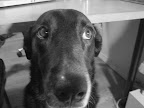I was nine years old. I had just taken a break from watching TV with Richard to pee, and was sitting on the toilet when I realized the water in the bowl was splashing up at me in a funny way. The house was swinging - exactly like that, like our house had been placed on the seat of a swingset and given a violent push. A crash and a yell sounded from the living room and then I was in the hallway, bracing against the walls, barely walking, feeling upended in a way that a decade later I would come to associate with uncontrolled intoxication, and pulling myself down the hallway to the backyard, where my brother and mother and I gathered and huddled and watched as the water from the neighbor's pool splashed over our fence. The palm tree behind the house bent like it was going to break its neck. All the while, there was this rumbling, rumbling, rumbling . . . like a train rushing through the neighborhood.
In my memory, the shaking went on for forty-five minutes and then turned into the dull vibration of constant fear which was not fully calmed until I left the Bay Area, nine years later. In reality, the quake lasted forty-five seconds, and the dull vibration of fear - well, I can't speak for other people's realities.
One strange thing that came out of the experience for me was learning to associate the warm feeling of belonging to a community with natural disasters. The earthquake gave me the opportunity, for the first time, to see all of my neighbors at once, emerging dazed from their homes, moving slowly from their driveways in clusters toward the center of the street and then just standing there, dumbstruck, immobile. I had never before believed these ghost houses held life - all one sees in the suburbs is one lonely metal capsule pulling in or out of a garage once an hour - but all of a sudden there it was, my street, my neighborhood, my people. Despite her shyness and crappy English, Mom must have exchanged comments with the prolific Mormon parents to the south and crotchety dog owners to the north, but I can't remember, and it didn't matter; words spoken or not, those were the people who would be pulling my skinny, golden brown California body from the rubble of my flat-topped three-bedroom house (should it tragically come to that). A powerful aftershock shook the leaves on the sycamore trees as we stood out there waiting.
When the earthquake hit, my spry eleven year-old brother had leapt out of the way of the three eight-foot tall entertainment center cabinets that pitched forward on the very spot he had been sitting and watching the game. That was the crash and the yell I had heard from the bathroom. I didn't really register the danger he had dodged but greatly admired my older brother's taekwondo-trained reflexes. Later, Richard and I busied ourselves sweeping up the detritus from the cabinets. "It's safety glass," he said, noting that the glass had broken into corn kernel-sized chunks rather than slivers and splinters. I thought "safety glass" meant safe glass, so I plunged - I don't know why I didn't test it first with some gingerly touching, but that's just how I did things, I guess - I plunged my hand into a bag we'd filled with pieces of glass, and pulled it out etched with itchy filamentary cuts. Nobody supervised this; Dad had yet to send word or show up from work, because the phone lines were dead and the bridges were closed and traffic was standstill on the highways, and Mom had her hands full with worry.
Public schools refreshed their earthquake curricula after the quake. How to horde water, flashlights, canned food; how to duck and cover; how to cower in a doorframe. I sat through the instruction thinking, "Why couldn't you have taught me this earlier??" Some strange Pavlovian conditioning made me associate the sound of the school bell with earthquakes: it rang once for recess, and twice for an earthquake drill, of which there were plenty in the days following the quake, but soon I came to associate the one-ring recess bell with shaking and violence and death, and for months afterward the sound signaling gay childhood playtime would also trigger in me physiological reactions of panic, i.e., elevated pulse, sweating, anxiety. My teacher never seemed to notice my fright at the beginning of every recess. The same thing happened with the rolling closet door in my parents' bedroom: its dry rumble sounded exactly like the rumbling I heard during Loma Prieta, so each time my parents went for a change of clothes, I would lay in bed gripping the sheets, breathing raggedly, waiting for the shaking to start. 1989-1990 was a very emotionally difficult year for me.
In school we learned that the San Francisco Bay Area straddled the San Andreas and its dozens of splinter faults. We were told to expect one major earthquake every 20-30 years. I recall thinking, as a nine year-old, that I loved California but wanted to leave it because earthquakes terrified me; I vowed to return in 2019, after the window for the next Big One closed. As it were, I left California but moved back in 2009, exactly when this big, dark Transylvanian castle of a window opened.
All to explain why as delighted as I am that the San Francisco Giants are one win away from another World Series, I hope to hell they don't make it all the way. I blame everything that happened in 1989 on the Giants reaching the World Series. I was an A's fan. In sum, go Phillies.

No comments:
Post a Comment